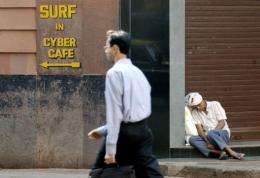'Anonymous' hackers to protest Indian Internet laws

Indian demonstrators supporting the global hacking movement Anonymous took to the streets on Saturday to protest against what they consider growing government censorship of the Internet.
Rallies in New Delhi, Mumbai, Bangalore and Kolkata followed a court order in March demanding 15 domestic Internet providers block access to file-sharing websites such as Pirate Bay.
The order has resulted in access being denied to a host of websites that carry pirated films and music among other legal content, including isohunt.com and pastebin.com.
On Wednesday, hackers attacked the website of state-run telecom provider MTNL, pasting the logo of the Anonymous group -- the mask of 17th century British revolutionary Guy Fawkes -- on mtnl.net.in.
Supporters also accused the government of trying to create a "Great Indian Firewall" to establish control on the web.
"The government is bringing censorship through the back door and we will oppose it," said Alok Dixit, one of about 50 hackers and activists who shouted slogans at the rally in central New Delhi.
Around 100 protesters gathered near Mumbai's main rail station, while a similar number also attended a rally in the information technology hub of Bangalore and a smaller group assembled in a Kolkata shopping mall.
Many wore Guy Fawkes' masks and vowed to hack into the websites of other large Indian corporations and the government sites.
Concerns about Internet freedom in India stem from an update to the country's Information Technology Act that was given by the IT and communications ministry in April last year.
The new rules regulating Internet companies -- providers, websites and search engines -- instruct them that they must remove "disparaging" or "blasphemous" content within 36 hours if they receive a complaint by an "affected person".
Groups such as the Center for Internet and Society, a Bangalore-based research and advocacy group, have waged a year-long campaign for amendments to the rules.
Industry groups have also objected, saying the new regulations are unclear and impossible to implement.
"A lot of education is required in this field," secretary of the Internet Service Providers Association of India S.P. Jairath told AFP.
The government has become embroiled in a row with social networks after Telecoms Minister Kapil Sibal held a series of meetings with IT giants Google, Yahoo! and Facebook last year to discuss the pre-screening of content.
The minister was said to have shown Internet executives examples of obscene images found online that risked offending Muslims or defamed politicians, including his boss, the head of the ruling Congress party, Sonia Gandhi.
Since these meetings, 19 Internet firms including Google, Yahoo! and Facebook have been targeted in criminal and civil cases lodged in lower courts, holding them responsible for content posted by users.
Anonymous is a "hacker-activist" network which has claimed online attacks on sites ranging from the Vatican to Los Angeles Police Canine Association, but is increasingly the target of police who have arrested dozens of members.
(c) 2012 AFP




















